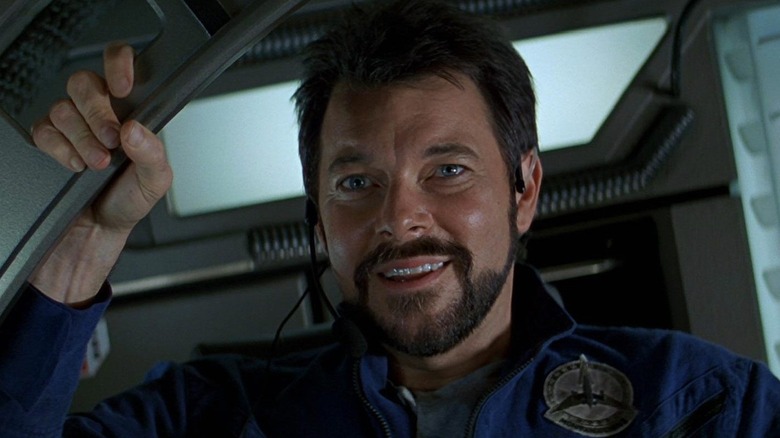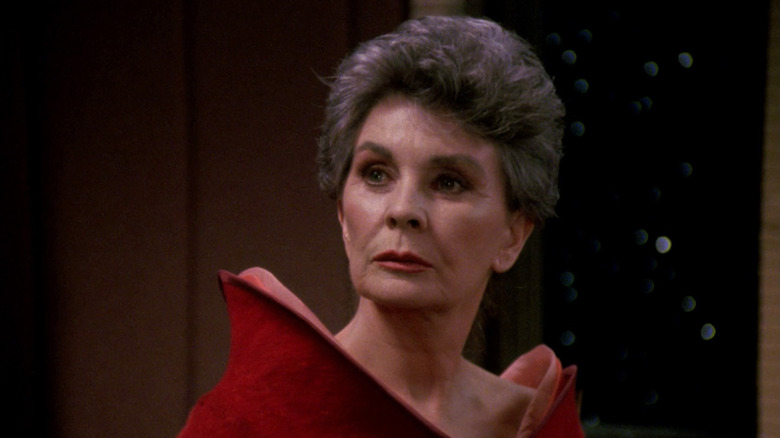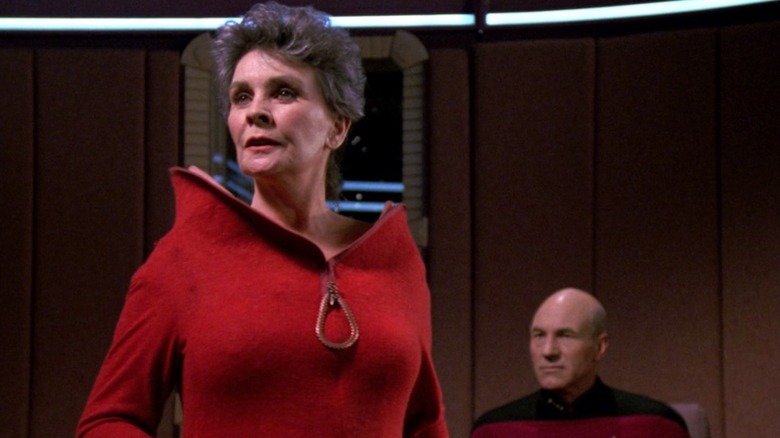Jonathan Frakes Decided To Break A Big Rule On One Star Trek Episode
Since concluding its seven-season run on May 23, 1994, "Star Trek: The Next Generation" has held up remarkably well. It took a season or two for the series to truly find its footing, but once it did the show not only matched but expanded on the Original Series' intellectually acute exploration of humankind at its very best and absolute worst. "TNG" was especially vital in the late '80s and early '90s as we witnessed the demolition of the Berlin Wall and the fall of the Soviet Union. There wasn't a show on television at the time that wrestled with our rapidly changing post-Cold War world more thoughtfully or bravely.
One element "TNG" shared in common with OG "Star Trek" was its adherence to an unfussy visual house style that left editors plenty of options as they tore through a 26-episode season order. This was television, where, very rare exceptions, the writers and actors were king. No one watched "TNG" eager to see a fluidly staged tracking shot, and the directors generally stuck to this aesthetically conservative approach.
Except for that rascal Jonathan Frakes. The man who continues to play Commander William Riker took his first crack at directing with season 3's quite good "The Offspring," and, having inhabited the show's sets for over 50 episodes, clearly had some subtly imaginative ideas for how to shoot them. But it wasn't until his third directorial effort, season 4's "The Drumhead," that he indulged his inner auteur. And he had every right to do it given the episode's guest star.
Boldly going where no TNG director had gone before
Frakes had Hollywood royalty on the set of "The Drumhead" with Jean Simmons. The two-time Academy Award nominee (for Laurence Olivier's "Hamlet" and Richard Brooks' "The Happy Ending"), and Emmy Award winner (for "The Thorn Birds") had been cast as a retired Starfleet prosecutor appointed to investigate a potential act of sabotage on the USS Enterprise. The script was a clear throwback to such conscience-stricken courtroom dramas as "The Caine Mutiny" and "Judgment at Nuremberg," which were made during the peak of Simmons' stardom. It was a strong piece of material, and Frakes felt this called for a departure from the visually conservative house style of "TNG."
Showrunner and executive producer Rick Berman understandably took an if-it-ain't-broke-don't-fix-it view when it came to the direction of a "TNG" episode. Frakes knew this better than anyone, but he felt obligated to do something special, especially since Simmons was a Trekkie and had lobbied to appear on the show. And so, as he told Variety, he colored a wee bit outside the lines:
"I tried to stretch the envelope. Rick was very strict. He was very traditional in his cutting. I wouldn't say I broke any boundaries. But I wasn't told not to do it, so I did it. I was very big on connecting questions to answers. I remember moving around the room and climbing up and down and staying with people, instead [of] it being cut, cut, cut, cut. I love when you connect what someone has said to the person who it said about or to."
A TNG triumph that is, infuriatingly, more relevant than ever
I was a junior in high school when this episode aired, but I'd watched more than enough films and television — though I had yet to see the movies he references — to know Frakes had done something different. And I remember feeling this was justified not because of Simmons, but because of the time in which it aired.
The Gulf War had ended two months prior to this broadcast, and, in the United States, it had been a massively successful PR campaign that obscured the oil-industry-driven objective by demanding that citizens "support the troops." In other words, if you were against the war, you were against the troops, which made you a traitor. There was shockingly little pushback from democratic leaders or the left-leaning punditocracy, and this is because they'd been bullied into ceding the ideological battleground.
Simmons' prosecutor is the highly respected daughter of a legendary barrister whose principles she wantonly violates by going on a witch hunt for traitors, even though she knows the incident in question was a structural failure. Her vicious rhetoric and vile dishonesty might've seemed heavy-handed to some at the time, but as someone who tried and failed to reason with the Gulf War's hyper-patriotic supporters, it rang true. Even then, I couldn't have possibly predicted a future America in which settled history and facts are brazenly denied by power-mad fascists.
"The Drumhead" might not be the greatest TNG episode, but it's damn close. And if we could all still agree that authoritarianism is something to be avoided at all costs, this episode would be screened in every high school across the country. It's marvelous work. Bravo, Mr. Frakes.


